Register for free and continue reading
Join our growing army of changemakers and get unlimited access to our premium content
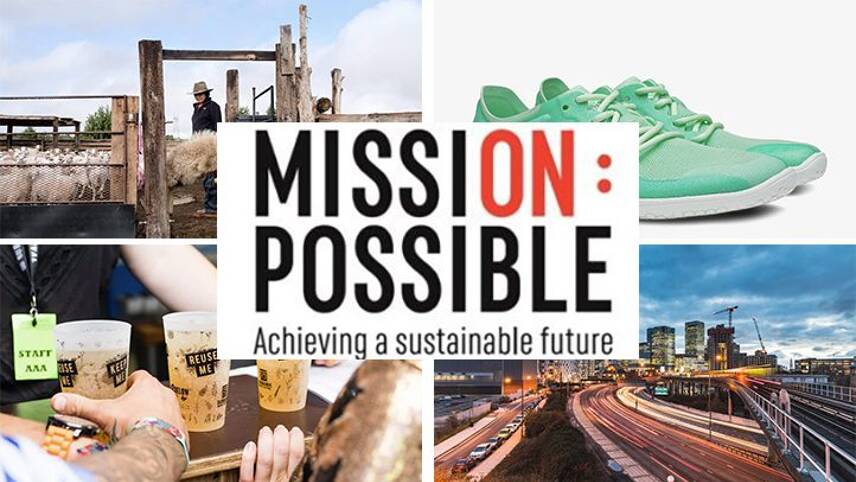
Published every week, this series charts how businesses and sustainability professionals are working to achieve their ‘Mission Possible’ across the campaign’s five key pillars – energy, resources, infrastructure, mobility and business leadership.
Across the UK and the world, leading businesses, cities, states and regions are turning environmental ambitions into action. Here, we round up five positive sustainability stories from this week.
ENERGY: Vodafone to support the creation of three new British solar farms

Image: Centrica
As it works towards a 2027 net-zero target for its UK operations, technology and telecoms major Vodafone has signed a ten-year Power Purchase Agreement (PPA) package that will see it contribute to the construction of three new solar farms in exchange for guaranteed electricity supply.
The PPA is between Vodafone, power supplier Centrica and generator MYTILINEOS Renewables and Storage. It will see Vodafone procuring around 55GWh of renewable electricity each year once generation begins – this should be the case by the end of 2022. The three solar farms will collectively supply more than 100GWh of electricity each year, so the remaining 45GHw will be sold to balancing and merchant power markets through Centrica’s Energy Marketing & Trading business.
Vodafone has already reached 100% renewable electricity for its UK operations, but some of this supply is met using REGO-backed tariffs. PPAs are often seen as more robust as they guarantee that additional generation capacity is being developed.
Vodafone’s chief executive for the UK, Ahmed Essam, said: “Today’s announcement ensures a significant proportion of our energy requirement, for at least the next ten years, is home-grown in the UK. I’m delighted Vodafone is helping to progress the development of new renewable power sites and supporting the delivery of more green energy to the UK grid.”
RESOURCES: Hubbub and Starbucks seek innovative reusable packaging schemes
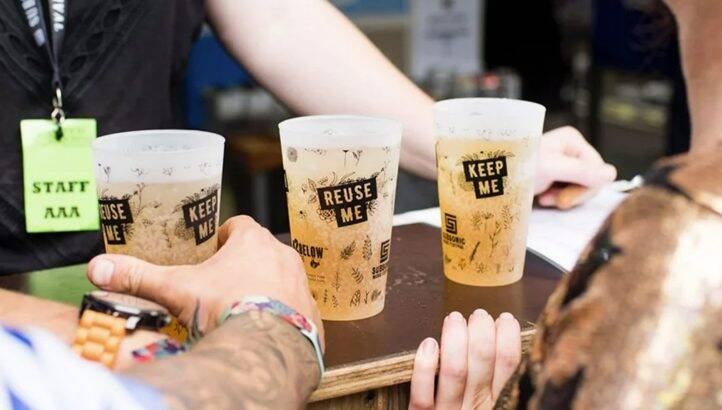
Image: Hubbub
Since summer 2018, Starbucks has added a 5p levy to the single-use takeaway drinks cups it sells in the UK. The funding raised through this scheme in 2019 was used to create a new ‘Cup Fund’ in partnership with the environmental charity Hubbub, designed to invest in cup reuse and recycling innovations.
This week, the two organisations announced the next project they are partnering on – the ‘Bring it Back Fund’. Using money raised using the 5p cup levy, the Fund will support pilot projects that help increase the uptake of reusable packaging in the food-to-go and beverage-to-go sectors. Up to five projects will receive Fund support, with each project set to receive between £150,000 and £300,000. Hubbub will be accepting applications for funding until 24 June.
“As we work to make reusability the only option, long-term the fund will provide solutions that will benefit the entire food and beverage industry,” said Starbucks UK’s general manager Alex Rayner.
She added: “The launch of the fund will work in conjunction with Starbucks existing reusables work, including the 25p reusable cup discount, 5p cup charge, in-store recycling and new returnable cup program to advance widespread adoption of reusables as we work to become resource-positive and reduce waste by 50% by 2030.”
MOBILITY: E-cargo bikes for business trialled in Wimbledon
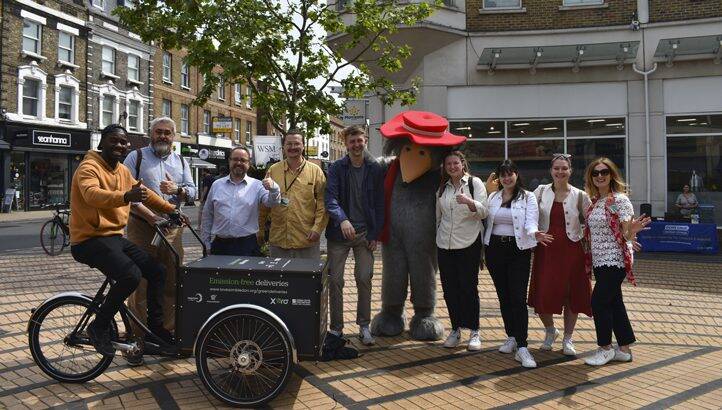
Image: Cross River Partnership
Shifting away from petrol and diesel vehicles for last-mile deliveries is becoming increasingly more common in the UK, as more towns implement net-zero plans, clean air zones and low-traffic streets and neighbourhoods.
In a further sign of this trend, the Cross River Partnership has facilitated a new e-cargo-bike use scheme for businesses in Wimbledon, under which SMEs can use the bikes for free provided that they sign up online first. The non-profit is working with the London Borough of Merton council, the Love Wimbledon campaign and cargo bike provider XeroE to deliver the scheme, which is being funding through the UK Government’s Clean Air Villages programme.
The hope is that, by trialling cargo bikes, business owners will be able to see that switching to this method of local deliveries is easy and will save costs and carbon.
“n our most recent Air Quality Action Plan, it was reported that approximately 60% of Nitrogen Dioxide emissions in Merton come from road traffic,” said the borough council’s director of environment and regeneration Chris Lee. “We believe the best way to eliminate these emissions is to make less polluting options more convenient. We have already started to do this for residents by installing hundreds of electric vehicle charging points, and making walking and cycling in the borough safer and more accessible. Now, we’re delighted to join with our partners to offer local businesses in Wimbledon an easy way to cut their emissions through the new cargo bike scheme.”
THE BUILT ENVIRONMENT: Industry experts convene to develop whole-life net-zero carbon standard for UK buildings
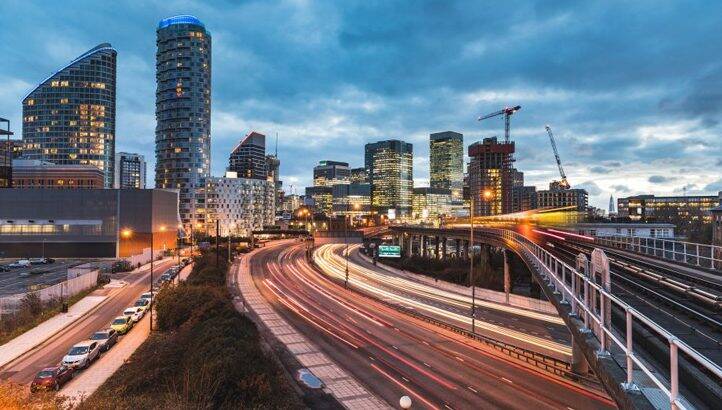
Image: UKGBC
A 2021 report from the World Business Council for Sustainable Development found that less than 1% of building projects currently account for lifecycle carbon impacts, with embodied carbon being a common omission.
In a bid to tackle this challenge, the UK Green Building Council (UKGBC) used its platform at COP26 to unveil a new roadmap that helps businesses at all parts in the building value chain to measure and reduce carbon.
The Council has this week built on that roadmap by announcing the formation of a new cross-industry group of experts to create a UK Net Zero Carbon Buildings Standard. The group consists of BBP, BRE, the Carbon Trust, CIBSE, IStructE, LETI, RIBA, and RICs, as well as UKGBC itself. Members have been tasked with developing a standard that can be achieved by new and existing buildings and which covers operational and embodied carbon.
You can read edie’s full coverage of this story here.
Also this week, UKGBC published an update on its strategic priorities through to 2025, detailing plans to accelerate decarbonisation and to develop new shared targets for climate resilience and environmental net-gain.
BUSINESS LEADERSHIP: Vivobarefoot partners with One Earth to fund Indigenous-led climate solutions
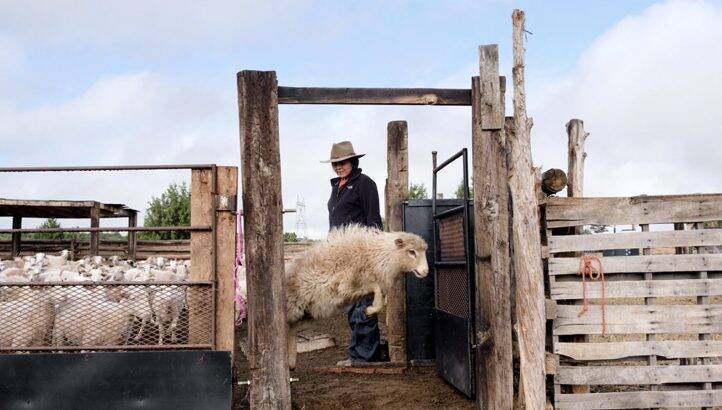
Image: The Rainbow Fiber Co-operative
Although they comprise less than 5% of the world population, Indigenous communities protect 80% of the Earth’s biodiversity in forests, deserts, grasslands, mountains and marine environments across the globe.
With this in mind, B Corp certified footwear brand Vivobarefoot has partnered with philanthropic organisation One Earth to drive donations to three Indigenous-led climate projects. The projects are The Rainbow Fiber Co-operative, which produces Churro wool using traditional regenerative methods; the Agroecology Fund and MELCA’s work to revive traditional farming practices in Ethiopia; and Amazon Frontlines and the Ceibo Alliance, which is pioneering conservation in the upper Amazon.
Vivobarefoot is using the social media and advertising campaign around its new line of Neo Mint shoes for adults and children to encourage customers to donate to these projects. Donations made through to 22 May will be matched by the partnership.
“Vivobarefoot is a partner that understands the urgency of listening to Indigenous wisdom and uplifting climate solutions,” said One Earth’s co-founder and executive director Justin Winters.
“This collaboration reminds us that making change isn’t a fanciful dream. We’re pragmatic… it’s possible to solve the climate crisis with solutions that exist today. It’s the people who are the game-changers – not politicians.”


Please login or Register to leave a comment.